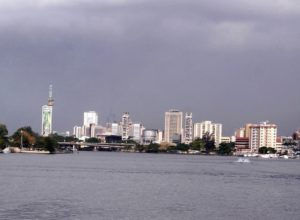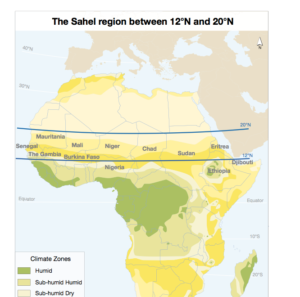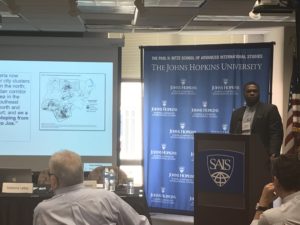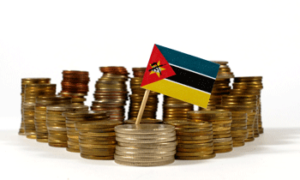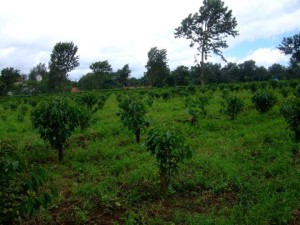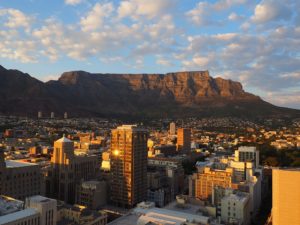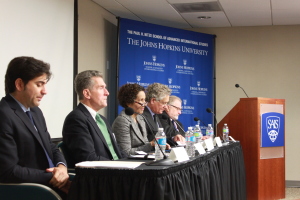The SAIS African Studies Program holds conferences each year that bring together international scholars, policy analysts, and the SAIS community to exchange perspectives on important themes in African affairs.
The Role of Technopreneurs in Lagos: An Emerging Smart City
Sahelian States in Crisis: Islamist Insurgencies, Counter-Insurgency Policies, and Prospects for Democratic Governance
March 14, 2018
Urbanization: Engine of Economic Growth for Regional Development in Nigeria?
April 21st, 2017
The Political Economy of Gender and Women’s Empowerment in Africa
April 14, 2017
Mozambique Secret Debt Crisis: What’s Next?
March 29, 2017
East Africa Oil & Gas: Has It Gone Bust Before the Boom?
March 28, 2017
Strategies for Economic Reconstruction in the Northern States of Nigeria
April 7-8, 2016
Reframing South Africa: Thinking About Transformation
December 1, 2014
The Politics of African Growth and Social Inclusion
Oct 16-17, 2014
“Kenya at Fifty” Conference
Sept 26-27, 2013
Governance and Security in the Sahelian States: From Crisis to Sustainable Recovery
April 11-12, 2013
The New African Democracy: Information Technology and Political Participation
May 1-2, 2012
Two Decades of Democracy and Governance in Africa: Lessons Learned, Challenges and Prospects
June 20-22, 2011 (Dakar, Senegal)
Africa: 53 Countries, One Union- The New Challenges
June 15-16, 2011
Africa’s New Era: Learning from the Past and Preparing for the Future
March 1-2, 2011
Hopkins All-University Seminar on Africa (HAUSA) Workshop
April 25, 2008
Elections in Africa: Democratic Challenges and U.S. Response
April 4, 2008
50 Years of Ghana’s Independence: Politics, Society and Development
November 2, 2007
China’s New Engagement With Africa: Opportunity and Challenge
China’s activities in Africa have expanded dramatically in recent years. Diplomatic engagement, foreign aid, trade, investment and lending have all grown substantially. Beijing hosted a major summit meeting of African leaders last year, and President Hu Jintao recently completed a tour through the African continent. China has become a major donor and trading partner to African countries, overtaking such traditional powers as the UK. China’s new engagement suggests a major transition in the strategic landscape of Africa.
What are the trends in China’s African relations, and the possible implications? While some observers see new opportunities for African economic development and strategic balancing, others see maneuvers for energy and commodities, along with possible liabilities for governance and security.
The SAIS African Studies Program, in partnership with the Council for African Studies at the School of International Service (SIS), will convene a major conference on April 6-7 to explore these issues.
Panelists will discuss:
- China’s evolving foreign policy goals;
- The articulation of alternate development models for Africa;
- African concerns and motives with relation to China;
- The effects of China’s engagement on energy and commodity markets;
- Implications for governance and security in the region;
- Important bilateral relationships between China and selected African states;
- European responses to China’s African relations;
- US policy and the new strategic terrain in Africa
- Participants will include scholars and policy professionals from Africa, the United States, China, and Europe.
Nigeria’s Political Outlook: The 2007 Elections and Beyond
Joint statement on Nigeria’s elections (released May 17, 2007): The statement reflects the views of individuals who participated in the Washington, DC conference series, and as election observers in Nigeria.
Nigerians look forward to state and national elections in April 2007, marking the first time since independence that civilian administrations will change through the ballot box. This democratic watershed is surrounded by a great deal of uncertainty, as Nigeria’s political terrain has become increasingly contentious. Will elections be held on time? Will the polls be peaceful? Will the results be broadly accepted by the Nigerian public? What is the potential for electoral violence? How will opposition parties and losing candidates respond? Will the 2007 elections mark a step forward for Nigeria’s fledgling democracy, or a crisis of confidence and stability for Africa’s most populous nation?
These questions will be addressed by panel of prominent Nigerian academics, media analysts and NGO leaders, joined by senior Nigerian leaders and US-based democracy partners. The half-day meeting will include sessions on:
- Nigeria’s political terrain
- The state of election preparations
- Luncheon keynote on Nigeria’s democratic prospects
Participants include:
- Mr. Reuben Abati, Guardian Newspapers
- Mr. Innocent Chukwuma, CLEEN Foundation and Transition Monitoring Group
- Dr. Jibrin Ibrahim, Center for Democratic Development
- Dr. Rotimi Suberu, University of Ibadan and USIP
- Dr. Peter Lewis, Johns Hopkins, SAIS
- Keynote Speaker: Honorable Nasir El-Rufai, Minister of the Federal Capital Territory
This is the first of four conferences on Nigeria’s 2007 elections, jointly sponsored by the Woodrow Wilson International Center for Scholars, the Center for Strategic and International Studies, the Council on Foreign Relations, the U.S. Institute of Peace, the African Studies Program at Johns Hopkins-SAIS and the African Studies Program at Northwestern University.
SAIS-Sorbonne Research Symposium: The United States, France, and Africa– Competition or Complementary?
December 8, 2006
This meeting, hosted by the African Studies Program and the Center for Transatlantic Relations, brought together scholars and policy analysts from the U.S and leading French institutions. About 90 participants from the U.S., Europe and Africa participated in the all-day conference.
Papers and commentary covered the changing position of Africa in the international system; the evolution of U.S. and French foreign policies toward Africa; the changing strategic landscape in Africa; and the particular challenges of peacekeeping in African conflicts.
Participants include:
- Daniel Bourmaud, INALCO, Paris
- Esther Brimmer, Center for Transatlantic Relations, SAIS
- Michel Girard, Sorbonne, Paris
- Peter Lewis, African Studies Program, SAIS
- Princeton Lyman, Council on Foreign Relations
- Jean-Luc Marret, Johns Hopkins SAIS, Center for Transatlantic RelationsFondation pour la Recherche Stratégique
- Stephen Morrison, CSIS, Washington
- Peter Schraeder, Loyola University, Chicago
- Paul Williams, Elliott School of International Affairs, The George Washington University
- I. William Zartman, Conflict Management and Security, SAIS

